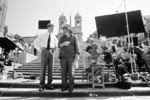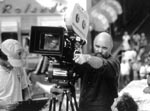In “The Talented Mr. Ripley” (Le talentueux Mr. Ripley, March 8),
Tom Ripley (Matt Damon), a dirt-poor, classically trained pianist in late 1950s Manhattan,
finds himself mistaken for a Princeton classmate of Dickie Greenleaf (Jude Law), insouciant heir to a shipbuilding fortune. Dickie’s father enlists
Tom to travel to Italy to convince Dickie to return home. Tom,
whose motto is “I always thought it would be better to be a fake somebody than
a real nobody,” bones up on Dickie’s favorite music — jazz — and sets sail for
Italy where he’s understandably knocked out by the breezy life
Dickie has bought himself in the company of his equally well-bred
fiancée, Marge Sherwood (Gwyneth Paltrow). Lounging on the beach, drinking in cafés, letting the hired
help tidy up — what’s not to covet? Tom has a gift for mimicry,
a talent for the quickly conjured fib and an as-yet-untested sexuality
as fluid as the Tiber.
Anthony Minghella, a playwright and musician-turned-director whose previous films
include “Truly, Madly, Deeply” and the floridly romantic “The
English Patient,” adapted Patricia Highsmith’s novel — which,
40 years ago, was made into the fetchingly suspenseful “Plein Soleil” (Purple Noon), starring a young Alain Delon. Minghella knows how to tell a
story with a movie camera: the settings are lavish and the lens
is always in the right place. The opening credits are a joy, as
is the soundtrack if you’re partial to a certain era in jazz.
It is an American birthright, a protean option, to “re-invent”
oneself. Americans swoon over real-life rags-to-riches stories;
the French are wary of them. The European approach is closer to
that of Snoopy, who once expressed his frustration and existential
acceptance as follows: “Yesterday I was a dog. Today I’m a dog. Tomorrow I’ll probably still be a dog. There’s so little room
for advancement.” In beagle units, Tom Ripley has been issued
a cheap plastic supper dish whereas Dickie Greenleaf laps cool
water from a platinum saucer. When the opportunity presents itself,
Tom murders Dickie and takes on his identity, a ploy that works
remarkably well — for a spell.
Minghella — an Englishman born to Italian immigrant parents and raised on the Isle of Wight — wears his thoughtful erudition
as comfortably as a pair of old sneakers. I enjoyed listening
to him respond to questions at a mid-February press conference
more than I enjoyed his film.
Q: The book was published in 1955. You’ve set the action in 1958-59.
Did you ever consider updating it to the present?
Minghella: If the film were set in 1999 or 2000 [it] would last about three
minutes because Ripley would be caught immediately in the world
of faxes and mobile phones and digital photographs. It relies
on a period when the infrastructure in Italy was so chaotic, it
was easier to get into Heaven than to make an international phone
call.
Q: There’s no mention in the press kit of René Clément’s “Plein Soleil,”
which was based on the same book.
M [warning — contains spoilers]: I’ve thought more about René Clément’s film in the last three
and a half weeks than I have in the last three and a half years
of making the film. I think “Plein Soleil” is a wonderful, special
film. When I read the book, three things jumped out at me. It’s
an American book. It’s about the American’s idea of Europe — the
comfort of Europe being a more liberal and sophisticated and accommodating
environment for the special and the odd and the misfit. It’s about
the opportunity to travel to somewhere foreign to remake yourself.
It’s written over Henry James’ “The Ambassadors” by an American
who took herself to Europe to reimagine herself. [Highsmith lived
for many years in Switzerland, where she died in 1995.] It’s about
a man who’s obsessed with another man. It’s about a man who commits
murder and is never caught. “Plein Soleil” is NOT about the American’s idea of Europe: it’s about a European who’s extremely comfortable in Europe.
There’s nothing strange about seeing the beautiful and extraordinary Alain Delon in Europe. Secondly, it’s about a man who’s obsessed with another
man’s money and opportunities and thirdly it’s about a man who
IS caught. I think there’s room for both films.
Q: Ripley is very adept at faking it, and success in show business
is sometimes predicated on those same, slightly devious skills.
Can you give us an example of having pulled a non-violent “Ripley” in your career?
M: Every day, in what we do, there’s a wrestling with a sense of
being an impostor. You make a film and it’s like ashes in your
mouth and you hope the audience will forgive you for the bluff
of the film, forgive you for the bluff of the play, the bluff
of the melody. I mean, what else can it be but that, in truth?
There is a sense of being a sham. That’s why the film is interesting, why Ripley is interesting — because the character survives because that’s what’s in all
of our hearts, the feeling that if people saw the truth of us,
they would reject it. That we all aspire to feeling that it’s
probably better to be a fake somebody than a real nobody.
Q: American reviewers have made much of Ripley’s bisexuality or homosexuality
or made him out to be a serial killer. What’s the core of the
film for you?
M: The film is very much about class. Highsmith talked about Ripley [a character who recurs in several
books] being her revenge on the beautiful and the privileged.
There is a huge sense of anger about exclusion that boils over
in the film. It comes from fear and anomie and dislocation, but it’s also
connected to anger from the haves toward the have-nots. If Patricia
Highsmith were here she might say, “The problem with this movie
is that it’s based on a novel by someone who had no interest in
God and was then made into a film by someone who’s obsessed with
God.” Which I am, in the sense of karmic reconciliation. There’s a wonderful thing in Dante that if you’re a flatterer
in life, then in purgatory you’ll be in manure. There must be some karmic
retribution if you give up on who you are and take on the life
of another. Ripley’s punishment is that just when he could be
loved for who he is, he can’t be who he is any longer.
Q: Murder is presented in all its ugliness and horror whereas nowadays
it’s glamorized more often than not. Is this approach an extension
of your obsession with God?
M: Yes. The things that move me and trouble me are to do with the
human spirit. We’re aspiring as best we can to make movies like
the movies that made us fall in love with cinema. The big commercial
film has in some ways trivialized so many things that I think
are important. It’s trivialized lovemaking, it’s trivialized the business of pain, of aspiration, of politics,
values. And it’s particularly trivialized LIFE in the sense that
it’s so casual in its depiction of violence. Killing people in
films is so easy. I remember seeing Kieslowski’s “A Short Film
About Killing” and being so shaken about the value of a life and
how hard it is to extinguish it. Matt and Jude and I discussed
the grotesqueness of taking somebody’s life away from them — and
how once you’ve done that, there’s no way back. I tried to make
that moment indelible.
Q: In the book, Tom is a painter. You’ve made him a musician, and
music, particularly jazz, is very present in the film.
M: At the heart of the film is a sense of “What is improvisation?” and the implications of improvisation. Because part of improvisation
is making things up. You’re given the tune and then you abandon
the tune. Jazz is the noise of this period, of the late ’50s.
It’s the noise of the new, of the cool, of Existentialism, of the Beat Generation. Dickie thinks of himself as someone who’s making himself up
as he goes along, whereas Ripley is a rather rigid, corduroy-jacketed
classicist, frightened of the moment, carrying Bach under his
arm. You discover that Dickie is actually rather conservative
— he’s thinking of a fridge, a car, a wife — whereas Ripley is
the true improviser. Ripley is the one who can’t stay on the notes,
who goes off on these wild implausible flights of fancy. Bach
was the greatest improviser in musical history. He was the one
who took an aria and made 32 incredible joyful variations on that.





